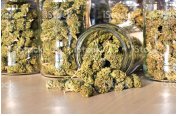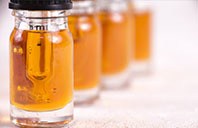The Law
In 2012, Washington state voters passed Initiative 502 to legalize and tax the sale of retail cannabis products. That means non-medical—sometimes called recreational—cannabis is legal for all adults 21 and over.
What are the laws?
When it comes to retail—or non-medical—cannabis, there’s a lot to know. But we’ve got you covered.
Buying it
Want to know if you can buy cannabis? You need to be 21 or older—and have a valid photo ID to prove it. With that, you can buy cannabis from any store licensed by the Washington State Liquor and Cannabis Board.
You’ll know you’re purchasing cannabis from a licensed Washington state producer if you see the universal symbol on its original packaging. And when you buy from licensed producers, you’re getting products that have been tested for quality assurance—protecting you from synthetic or untested cannabis.
Over 21? Here’s how much you can have on you at one time:

1 oz. of useable cannabis
Like harvested flowers or “bud.”

16 oz. of cannabis-infused, solid edibles
Think candy, brownies, crackers, mints, and more.

72 oz. of cannabis-infused, liquid products
That’s your teas and juices.

7 grams of cannabis concentrate.
Including things like dabs and oil.
Under 21? Using or possessing cannabis—sometimes called marijuana, pot, herb, bud, weed, grass, chronic, dank, dope, ganga, and kush—before the age of 21 is illegal unless medically authorized.
That includes sharing cannabis with anyone underage, like your friends or family. Which also means it’s illegal for even parents to give cannabis to their teens.
Growing it
What about growing cannabis? You need to be medically authorized or licensed by the state as a cannabis producer. Without these permissions, growing cannabis plants in Washington state is illegal.
Using it
While cannabis use is legal, there are still laws on where you can and can’t use it. For example, you can use cannabis in some private spaces, but you can’t in public places. That includes anywhere that’s in view of the public or has a smoke-free policy. It’s also important to note that while some people vape because it’s not as smelly as smoking cannabis, it’s still illegal to use cannabis in any form in public.
Because retail cannabis is still a federal offense, it’s illegal to use on federal lands, like parks. Tribes, which are sovereign nations, have their own laws and may also prohibit the sale and use of cannabis on their land.
In the car
Speaking of where you shouldn’t use cannabis. When it comes to the car, cannabis should stay in its original, unopened package and out of reach—like in the trunk.
Driving a car or operating a boat under the influence of cannabis isn’t just illegal—it’s dangerous. That goes for passengers too. Even if you’re only along for the ride, it’s still illegal to have cannabis outside of its original, unopened package or use it while in the passenger seat.
On campus
What about colleges? As far as Washington state goes, it’s against policy to use cannabis on any public or private college or university campus.
What about employers and landlords?
Your employer and landlord have rights around cannabis—here’s what you need to know.
Their rights
Every employer and landlord is different. But each of them has the right to restrict cannabis use—even if you’re of legal age. So, before you use, ask your employer or landlord their rules around cannabis.
What if I’m traveling?
Whether you’re visiting Washington state or leaving it, learn the laws around traveling with cannabis.
Coming
Like tobacco, smoking cannabis in any indoor location is subject to the restrictions of the Washington state’s Smoking in Public Places law (RCW 70.160). Not sure how this applies to you? Ask your hotel about their rules regarding smoking or using in rooms.
Going
Leaving Washington state means leaving cannabis behind. Because when you buy cannabis in Washington, it’s illegal to take it across state lines—even if you’re traveling to a state where retail cannabis is also legal.
